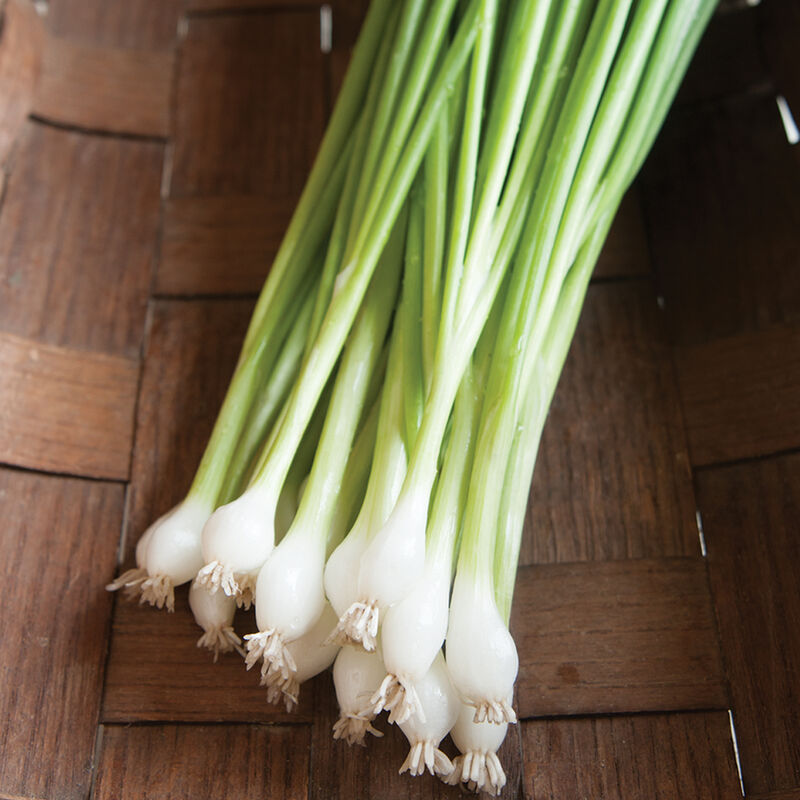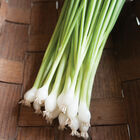Guardsman Onion Seed
Product ID:29.1129
Guardsman Onion Seed
Product ID:29.1129
The earliest bunching onion we've found.
This selection, from a cross between a bunching onion and a bulb onion, produces the shape of a bunching onion with a strong root system, larger top, and the mildness of a bulb onion. Guardsman is our recommended scallion for overwintering in the North.Specs:
- This product does not ship to the following countries: United Arab Emirates, Austria, Australia, Barbados, Belgium, Bulgaria, Bermuda, Bahamas, Switzerland, Cyprus, Czech Republic, Germany, Denmark, Estonia, Spain, Finland, France, United Kingdom, Greece, Hong Kong, Croatia, Hungary, Ireland, Iceland, Italy, Japan, Republic of Korea, Kuwait, Cayman Islands, Lithuania, Luxembourg, Latvia, Malta, Netherlands, Norway, New Zealand, Oman, Poland, Portugal, Qatar, Romania, Saudi Arabia, Sweden, Singapore, Slovenia, Slovakia, San Marino, Thailand, Trinidad and Tobago, Taiwan, Ukraine.
SCIENTIFIC NAME:
Allium fistulosumCULTURE:
Seed can be sown in early spring for summer use, and in July or August for fall and spring use. Bunching onions prefer a soil with a pH of 6.2–6.8. Extra-hardy varieties will normally survive the winter if the soil is well drained.DAYS TO MATURITY: From direct seeding; subtract 10–15 days for days to maturity from transplant.TRANSPLANTING:
Sow 6–8 seeds per cell in 72-cell trays at the same time you would seed bulbing onions for transplant. Transplant seedling clusters 6–8" apart in rows 18" apart. For Negi-style scallions with a thicker blanched portion, start in flats. Then, beginning in late spring, when 8–18" tall and pencil-thick, transplant outdoors 6" apart, rows 24" apart in holes dibbled about 6" deep. Only 1–2" of leaves need extend above the soil surface. Do not firm soil — allow irrigation or rain to fill in the dibble hole.DIRECT SEEDING:
Sow ¼" apart in rows of 2–3" wide bands,¼–½" deep. Thin to about an inch apart only if large diameter is needed. Keep well cultivated so that plants receive maximum light.AVG. DIRECT SEEDING RATE:
1 oz./250', 4 oz./1,000', 1 lb./4,000', 7½ lb./acre at 50 seeds/ft. in 2" wide bands 18" apart.BLANCHING: During the growing period hill the plants with soil 2 or 3 times, higher with each hoeing. This forces the leaves higher up the plant resulting in extra-long blanched stalks and a much greater edible portion. When using the "dibble method", hilling is reduced or eliminated.HARVEST:
Loosen with fork or underminer and gather. Wash, hydrocool, and hold at near freezing until shipped or displayed.SEEDS/LB. (AVG.):
150,300.PACKET:
500 seeds, sows 10'.Johnny's is committed to your success, every step of the way.
We want you, our customer, to be 100% satisfied with all of our seeds, tools, and supplies.
If anything you purchase from us proves unsatisfactory, we will either replace the item or refund the purchase price.




